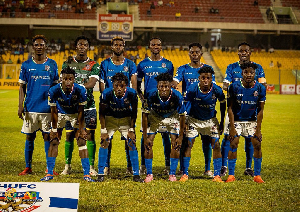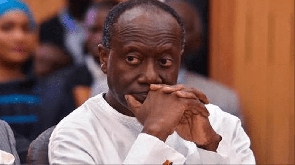General News of Friday, 29 June 2018
Source: classfmonline.com
Communications Ministry must face same fate as EC Commissioners for KelniGVG contract - IMANI
Think Tank IMANI Africa has said if the chairperson of the Electoral Commission, Mrs Charlotte Osei and her two deputies, Georgina Opoku Amankwah and Amadu Sulley could be dismissed for violating the Public Procurement Act, and the Public Financial Management Act, then same should be done to those at the Ministry of Communications who signed the KelniGVG contract.
A committee set up by the Chief Justice, Justice Sophia Akuffo, to investigate separate complaints brought against the three persons by Ghanaian citizens, recommended their removal.
President of Imani Africa, Franklin Cudjoe, said the same fate must befall persons who signed the KelniGVG contract.
Government entered into a contract with KelniGVG to provide real-time traffic monitoring of mobile phone communication.
The ministry is implementing a common monitoring platform to ensure optimum revenue collection from the telcos.
Even though government says the contract is $89m, Imani Africa says the cost of the contract is $178m.
Mr Cudjoe believes the deal is a rip-off and needless.
In a statement, he said: “As Electoral Commissioners Fall on Violations of Public Procurement Act, and the Public Financial Management Act, Controversial $178m KelniGVG Contract must suffer same and more.”
Read full statement below:
As Electoral Commissioners Fall on Violations of Public Procurement Act, and the Public Financial Management Act, Controversial $178m KelniGVG Contract Must Suffer Same and More.
So, it is the case that the President of Ghana by law, yielded to the recommendations of a Judicial Committee for the removal of three Electoral Commissioners. The Electoral Commissioners were removed from office for violating the Public Procurement Act, and the Public Financial Management Act. The Commissioners will have to defend themselves.
Nice! We need to uphold the rule of law at all times. Now, let us look at the curious case of the KelniGVG contract supervised solely by the Ministry of Communications and how it also violates the Public Procurement Act, and the Public Financial Management Act. But first a short introduction.
The Ministry of Communications has signed a $178 m contract to an ‘unknown’ company beyond its name, KelniGVG. It signed on behalf of the Finance Ministry. The contract essentially is paying $1.5m every month to KelniGVG for the next 10 years to apparently assure revenues and traffic monitoring on the nodes of telecommunications companies without any credible performance indicators. What is worse, should the Ministry of Communications decide to opt out of the contract at any time, Ghanaians will pay 50% of the unexpired term of the contract.
IMANI has asked, why do we spend $125 million through the Ghana Revenue Authority (GRA) to collect, monitor, and assure all the $7.5 billion we collect, and around $25 million to collect, monitor and assure all the $1.23 billion we collect in taxes from companies in Ghana, but want to burn nearly 40 cedis in every 100 cedis we collect in communications services tax as the KelniGVG contract demands? What is the logic?
IMANI concludes that if we run a KelniGVG type monitoring system, at a similar cost, for all industries in Ghana, we would be spending $3 billion yearly just to monitor taxes. The country would literally collapse.
Now unto the violations as mentioned earlier.
1. The Kelni GVG contract is multi-year, so section 33 of the Public Finance Management Act, 2016 requires that it should be approved by (a) the Minister for Finance, and (b) Parliament. Even though payments have been made, the contract has not been approved by Parliament. The statement by the Minister for Communications on the floor of Parliament does not represent parliamentary approval.
2. In the contract, the Ministry of Communication (MoC) and Kelni GVG (KGVG) have agreed that the National Communications Authority (NCA) should pay for the KGVG's services. This offends the National Communications Authority Act, 2008 (Act 769) which makes the NCA a body corporate with its own governing board. The NCA cannot pay for services it has not contracted.
3. Again the MOC and KGVG have agreed that the Ghana Revenue Authority (GRA) pays for the services of KGVG. This also offends the GRA Act, 2009 (Act 791) which makes the GRA a body corporate with a governing board. The GRA cannot pay for services it has not contracted, which services are outside their budget as approved by Parliament in the 2018 Budget Statement.
4. The Communications Services Tax (Amendment) Act, 2013 requires the Minister for Finance and Minister for Communications to set up the common monitoring platform that KGVG is providing. The payment for the services should be captured in the budgets for these two ministries and paid for by them. If they did not, then as covered entities under the PFMA (Act 921), they should revise their budgets through due process before the two ministries can take on those expenditure.
5. Ministry of Finance, Ministry of Communications, GRA, and NCA are all covered entities under the PFMA. No covered entity is permitted to incur cost and place it on another covered entity that has not budgeted for that expenditure. Please note that under section 96(2) of the PFMA (Act 921), it is a criminal offence punishable by imprisonment or a fine, or both, for a spending officer to spend beyond their budget.
6. On any of these grounds, the contract could be cancelled or any payment for the contract by NCA or GRA can be made unlawful by a court. And the two ministries just cannot find the budget to finance this KGVG contract.
7. This is why the Ministry of Communications, Ministry of Finance, NCA and GRA have all been a cited as defendants /respondents in court suits.
Franklin Cudjoe on behalf of real citizens. :)
Respectfully yours,
Franklin Cudjoe
Founding President & CEO, IMANI
www.imaniafrica.org












